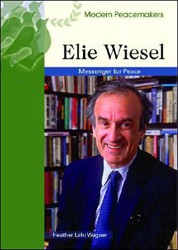When Romek Wajsman was liberated from the brutal concentration camp of Buchenwald in 1945, both his physical and emotional selves had been subjected to unfathomable torments. Only fourteen years old, Romek, who would later assume the name Robbie Waisman as an emigrant to Canada, had lived before the war in a small Polish shtetl. Along with 472 other young boys whose families could not be located, he was rescued and sent to safety and planned rehabilitation in France. Although professionals and other kind adults at his group home optimistically intended to restore Romek to health, they were unable to understand the trauma he had undergone. In this deeply honest memoir, Boy from Buchenwald, Waisman describes his life before deportation and the horrors of being a child in Buchenwald. He unflinchingly analyzes the wounded young adult he had become and the process through which he gradually learned to start his life over while remaining faithful to the past that he had irrevocably lost.
Young readers who may be unfamiliar with Holocaust memoirs will learn about the devastating experience of children separated from the parents and deprived of their humanity, but even those who have read Holocaust sources will gain both knowledge and hope from this book. Waisman chronicles his ambivalence with great insight as he looks back from the perspective of a long and successful life to the child he used to be. All human values were obviously distorted beyond recognition under the Third Reich. Waisman shows through his own eyes exactly what it felt like to be the victim of Nazi terror and then painfully put the pieces of his psyche back together and return to life. He avoids easy conclusions and focuses on the individual coping strategies that he and other young survivors adopted.
Waisman mourns his Jewish life before the war, reminiscing about his parents, siblings, and the customs and rituals of Jewish life that would never again hold the same meaning for him. Working as slave labor in a Nazi munitions factory, Romek listens to the warning of a fellow inmate about the dangers of internalizing hatred and becoming demoralized. Yet he is unable to ignore the obvious fact that survival in the camp became the paramount concern, with Jews from different communities turning against one another. After American soldiers freed them from their hell, he admits that he and other “Buchenwald boys” dealt with their rage by “stealing from Weimar families and shops, vandalizing homes and public buildings, and trying to kill one another.” This is not a comfortable message, but Waisman articulates the reality that surviving the camps was a beginning, not the definitive assurance of, a new life.
There are unforgettable portraits of the many people who crossed paths with Romek. Some unambiguously offered their patient support. Professor Manfred, who also lost his family, offers a model of stoic determination while Ralph, a committed Communist, relies on an ideology that Romek cannot embrace. A young Elie Wiesel, also a Buchenwald survivor, advises him to look for solace in religious practice. Others actually advise him simply to put the past behind him. One wealthy woman becomes his benefactor; she and her family ultimately offer to adopt him. Only by integrating the past into his development and new relationships is Romek able to find meaning in a life fractured by tragedy.
This highly recommended memoir includes an epilogue, additional historical information, and a timeline, as well as photographs.
Emily Schneider writes about literature, feminism, and culture for Tablet, The Forward, The Horn Book, and other publications, and writes about children’s books on her blog. She has a Ph.D. in Romance Languages and Literatures.




